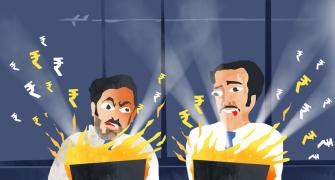 It all began with an e-mail exchange between father Shyam Shroff and his son Shravan.
It all began with an e-mail exchange between father Shyam Shroff and his son Shravan.
In 1996 Shravan Shroff, then managing director of Fame India, sensed a gap in the cinema exhibition business and approached his father with an expansion plan.
He had located two theatres in Mumbai -- one in Goregaon and the second Cinestar, in Kandivali.
According to the proposal the theatre owner would make the capital investment and the Shroffs would pay a weekly rent and deposit of Rs 50 lakhs (Rs 5 million).
Shravan rolled up his sleeves and started from scratch, even making popcorn and handling projectors among other jobs.
Soon, he realised that the future lay in multiplexes and not single theatres. The MBA graduate from Australia's Melbourne Business School then raised the stakes to venture into the multiplex business. He needed Rs 15-16 crore (Rs 150-160 million).
His father lent him Rs 2.5 crore (Rs 25 million) and Shravan approached Adlabs, then owned by Manmohan Shetty (and now called BIG Cinemas owned by the Anil Dhirubhai Ambani Group), for another Rs 2.5 crore.
Adlabs agreed on the basis that it would simply be an investor and Shravan would manage the business.
After nearly spending a year pursuing IDBI Bank, Shravan managed to raise Rs 9.5 crore (Rs 95 million) at a time when banks were wary of investing in such an uncertain industry.
In earlier interviews to the media, Shravan said, "I think my biggest achievement was that I was able to raise organised capital in the country." In 2001 India Value Fund Trustee Company Private Ltd came on board to fund the company's expansion.
From just three cinema halls Fame's explosive growth to around 95 screens across 12 cities with a strong presence in key markets like Maharasthra, Haryana, West Bengal, Jharkhand, Gujarat and Karnataka has made it one of the most sought-after theatre chains in the country.
No wonder ADAG firm Reliance MediaWorks (which operates theatre chain BIG Cinemas) is crying foul after INOX Leisure acquired 51 per cent in Fame India (43.28 per cent for Rs 44 per share and 7.5 per cent at Rs 51 per share).
The ADAG company has claimed that Fame has not played fair by rejecting its much higher offer at Rs 80 a share and has sought an explanation from Shroff.
The chagrin is understandable because quite apart from the critical mass that Fame's chain would bring to BIG, ADAG has been chasing Shroff for two years now.
On his part, Shravan told Business Standard that Reliance MediaWorks had not made any written offer to Fame India on a higher price.
Under market regulations, INOX is now in the process of making an open offer, scheduled for April, for Fame for an additional 20 per cent stake.
But Reliance MediaWorks has threatened to write to various authorities.
"We would bring all relevant facts to the notice of all regulatory authorities, including the Securities and Exchange Board of India, the ministry of corporate affairs, the Reserve Bank of India and the income tax authorities," said a company spokesperson.
The company's management claims that the Fame-INOX deal involves serious matters relating to suppression of material facts, violations of the Sebi Takeover Code and Sebi Fraudulent & Unfair Trade Practices Regulations, the fiduciary duties of promoters of listed companies and protection of the interests of minority shareholders.
Meanwhile, ADAG firm Reliance Capital Partners increased its stake in Fame to 7.89 per cent on February 9, an indicator of a takeover battle ahead.
Whatever the drama that's played out over Fame, Shravan himself is taking time out to decide what he wants to do next.
A non-compete clause with INOX will keep him out of the multiplex business but since Bollywood is clearly in his family's business DNA, it's not surprising that he wants to stick to the entertainment industry.
A partnership company formed in the 1950s by Shravan Shroff's grandfather and his brother (Gobindram Naoomal Shroff and Vasudev Naoomal Shroff) with the objective of bankrolling Bollywood, the Shroff family business has come a long way.
It started out financing films like Dushman, Guide, Do Raaste, Evening in Paris, Aradhana, Kafila and Dharma among others under the 'Issardas Naoomal' banner and went on to distributing films -- Holi Aayee Re, Mera Gaon Mera Desh, Sazaa and Dilli Ka Thug -- in the 1960s under a film distribution company Maya & Co formed by Shyam and his cousin Balkrishna Shroff.
The second generation began exporting films like Julie, Kinara and Prem Nagar in the overseas market, after which the famous Shringar Films was launched in 1975.
Shravan Shroff took over the reigns in late 1990s and ventured into the movie exhibition business. In 2004 the company was listed on the stock exchanges.
The film distribution business is carried out under Shringar Films and the exhibition business under Fame India (formerly Shringar Cinemas).
Image: Shravan Shroff. | Photograph: Business Standard








